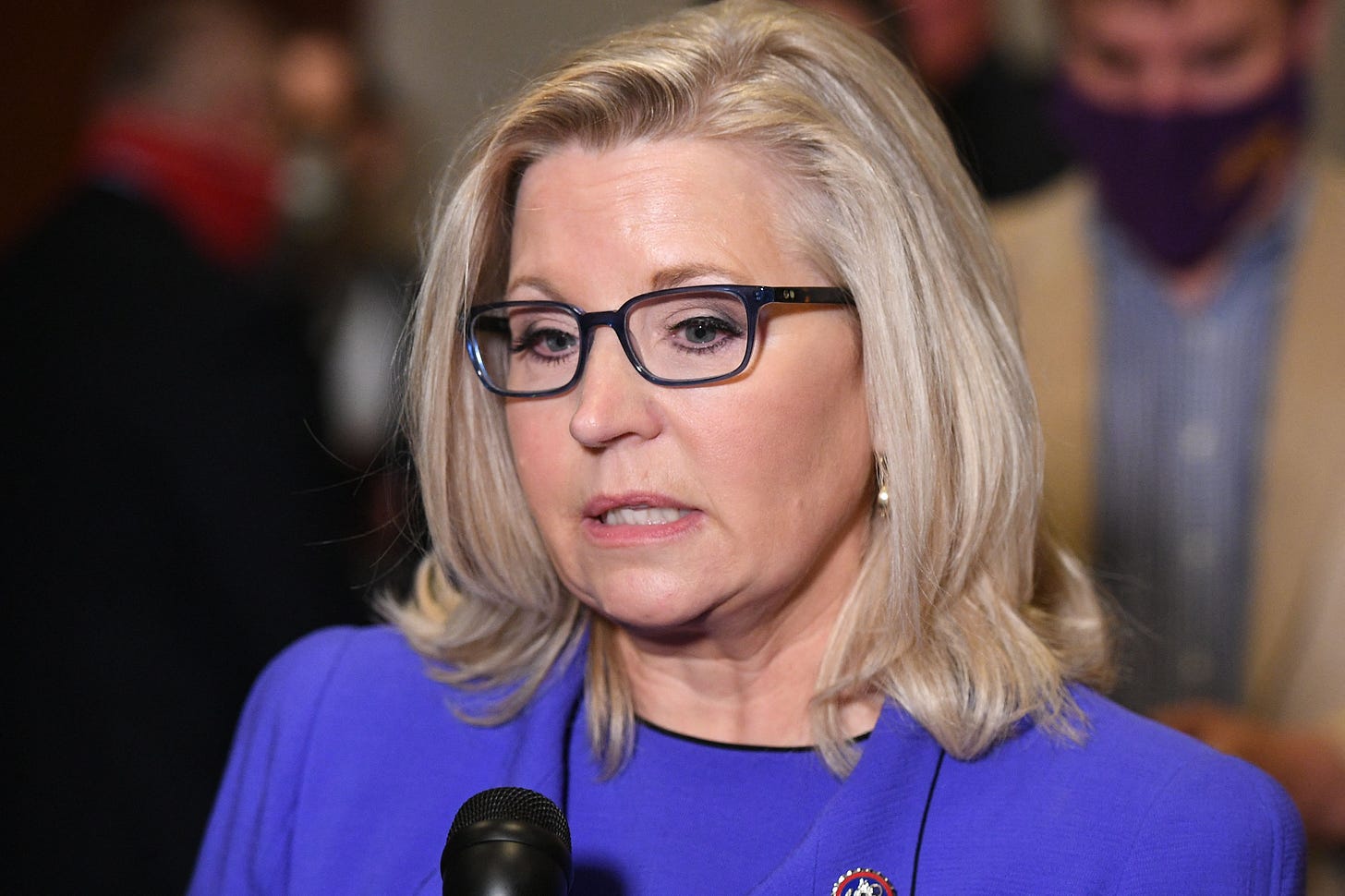Liz Cheney was removed from leadership today by House Republicans, her fortunes having reversed since an identical February 3 vote that went 145-61 in her favor. The media’s narrative is that this is all revenge for having voted to impeach Trump on January 13; her fellow Republicans, it is said, do Trump’s bidding no matter what.
One of the few good political reporters in Washington, Byron York (Chief Political Correspondent for the Washington Examiner), pointed out today the many ways in which this doesn’t add up:
Now, Cheney, who won by 84 votes in February, has lost a second vote. That means a lot of the 145 Republicans who (anonymously) voted to keep Cheney in leadership in February voted (again anonymously) to remove her now. What happened? Did those members who were OK with Cheney's impeachment vote back in February suddenly become so angry about it that they now voted to remove her? That doesn't really make any sense. Why would Republicans be less angry and more tolerant in early February, closer in time to the Trump impeachment, and more angry and less tolerant in May, now that more time has passed?
Were House Republicans somehow not in thrall to Trump on Feb. 3 but in thrall to him now? Again, it just doesn't make sense.
The real problem is that Liz Cheney has decided to build her “brand” on running Trump and his movement out of the party, while her colleagues want to focus on fighting the Left and re-taking Congress in 2022. The Washington Post has a piece out this morning (“Inside Liz Cheney’s plan to take on former president Donald Trump”) detailing what is obviously a maturing and months-old political and media strategy by representative Cheney, her advisors, and her donors.
The rise of Trump and his appeal to, and deployment of, a remarkably effective and passionate national political coalition are just the latest signs of a growing revolt on the right against the uniparty establishment of the post-Cold War era. The revolt on the right against post-1960s American government of course goes back farther, represented by the fights in the Reagan administration between the true-believers and the George H.W. Bush faction, which purged the Reaganites from what was sold as a kind of third Reagan term when they took over. The American revolt against post-1960s government and the resulting deep-state countermeasures really started with Richard Nixon’s ouster, as my colleague John Marini has argued over the years.
So how should we understand the establishment right’s rejection of Trump, a rejection which derives energy, money, and deploys backroom skullduggery that goes well beyond the NeverTrump claque? It’s really a rejection of a substantial portion of the American people’s discontent with government and business over the last few decades.
Part of the revolt against the conventional Republican establishmentarianism included Pat Buchanan’s middle-America culture-war populism and various paleo-libertarian strains of resistance. The now mostly forgotten, but often very perceptive, Sam Francis wrote the following in Chronicles in 1997:
Of course, not everyone on what is usually called the "right" harbors sympathy for revolutionary change. Soon after Buchanan started talking about peasants storming the castles with their pitchforks. Bill Kristol was dragged forth by the Washington Post to enlighten us with his own cogitations. "Someone needs to stand up and defend the Establishment," he whined. "In the last couple of weeks, there's been too much pseudo-populism, almost too much concern and attention for, quote, the people—that is, the people's will, their prejudices and their foolish opinions. And in a certain sense, we're all paying the price for that now. . . . After all, we conservatives are on the side of the lords and barons."
Mr. Kristol is correct. "Conservatives"—those who want to conserve—are on the side of the lords and barons, and the fact that the delusions and pathologies of the left have long since acquired political and cultural hegemony in the United States means that real conservatives like Mr. Kristol wind up defending the achievements and interests of the left. When he, his colleagues among the neoconservatives, and the mainstream of the Republican Party denounce Buchanan for his attacks on the "Establishment," they betray the reality that all their right-wing affectations are masks for the defense of the incumbent system of power.
It is good to see Bill Kristol has remained consistent for the most part, although we ought not to forget his lack of qualms in using populism for his own ends—see, for example, Sarah Palin. Francis, in 1997, already points to the problematic nature of the term “conservative.” The term is dispositional, and is part of the reason the Claremont Institute has preferred an emphasis on the principles of the American founding as the guide to restoration and renewal—a restoration and renewal that in a time of crisis after a century of liberalism might mean a kind of counterrevolution.
Which brings us back to Liz Cheney. She, Kristol, and others on the merely anti-Trump “right” accept, fundamentally, the post 1960s settlement in American politics. This includes an enormous, unaccountable, and anti-constitutional administrative state; a permanent and bloated security state, invested in and constantly preening over endless foreign meddling; a self-serving notion of “free trade” that enriches the ruling class and its valets at the expense of the working and middle class; and a rejection of the quaint notion that a sovereign people might have the ultimate decision of who can and can’t cross the border and join the political community. This means that establishment conservatives can’t help but devote themselves to the conservation of leftism. They tout conservative policies that fiddle at the edges—while Rome burns.
Trump ran and capitalized on this now-decades-old revolt on the right. He made his share of mistakes, especially in matters of personnel and quite a few errors of ‘omission and commission’ leading up to the 2020 election. But any meaningful successor, and any serious political party (current or future) that wants to recover and preserve the American way of life, will have to forge similar political paths against tremendous, and entrenched, opposition.






A summation of the article:
Voters: Reagan
Establishment: "Read my lips" Bush
V: Contract with America!
E: Compassionate conservative Bush
V: Scott "Stop Obamacare" Brown!!
E: Romneycare for President!
V: TRUMP!
E: GFY!
It’s going to take courage, will, and focus. Whomever it’s going to be is going to need some help from not just the voters but the entrenched.
A new party or takeover of whatever party needs real goals by real leadership. Leaders who mean what they say and say what they mean. Not actors, hype men, or plants by donors who don’t give a crap about the US. Goals centered on the Constitution and Declaration and not self destruction and tyranny. US economic goals and not goals of foreigners who hate America. Win for all Americans. Going to need protections from the various adversaries as well.
The Cheney (U-DC) stuff smells of the McMuffin (U-DC) strat (whatever his name was). Splitter strat, controlled opposition, whatever. It’s boring and predictable. No one cares about Cheney. Now what we know about voting did anyone really vote for her?
She’s going to leak a bunch of stuff etc...To all the leftist “newz”. Influencing somewhere near zero people. If the Republicons meant business they would toss her out of the party but they are busy pretending and reading scripts. Too bad Not-a-Leader McCarthy (U-DC) is not going with her...
A humble person might just bail out and go away and enjoy their club earned riches. But that’s not the plan is it?
Lots of work to be done.